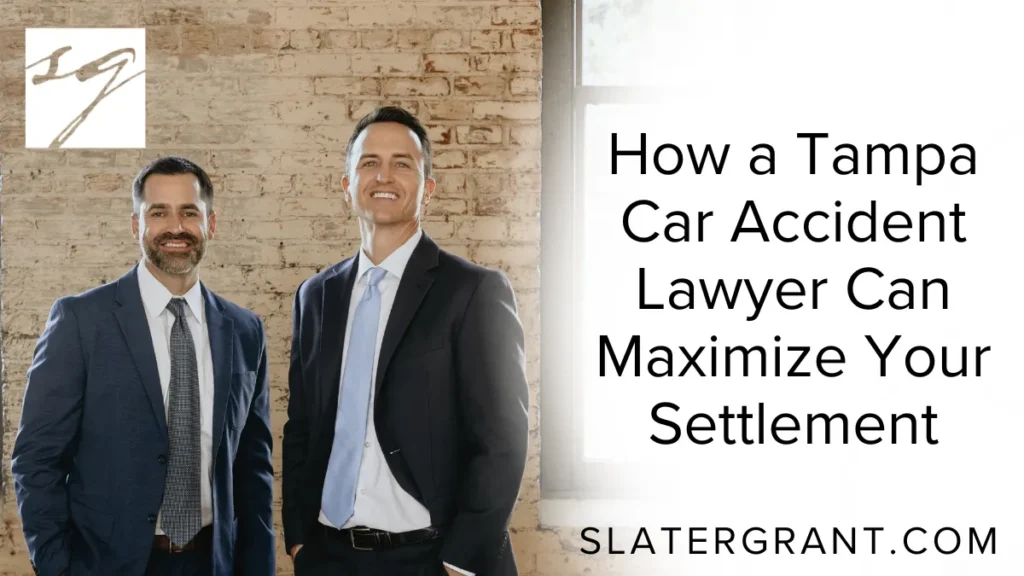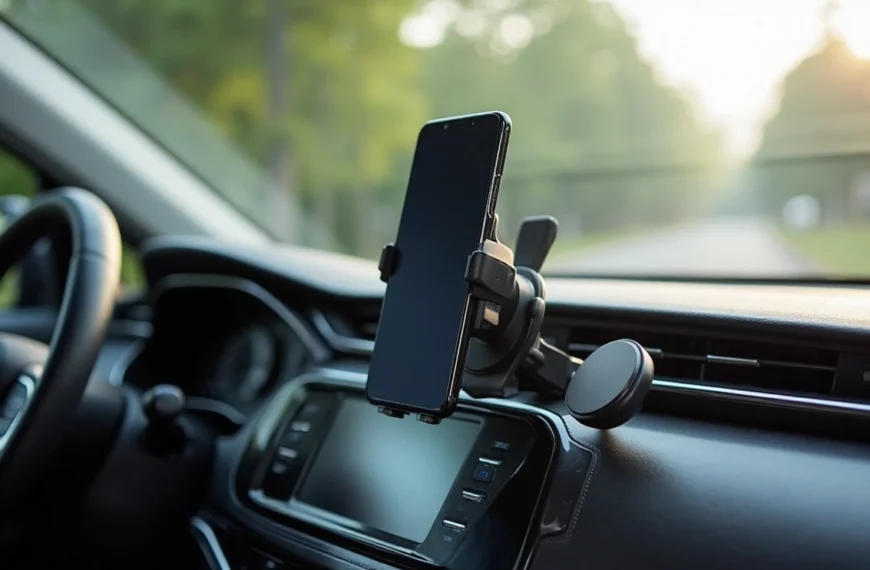Should you get an attorney after a car accident? This question affects nearly 6 million Americans annually who end up in auto accidents, based on National Highway Traffic Safety Administration data. The choice can impact your finances in the most important ways. Research from the Insurance Research Council shows that people who hire attorneys get 3.5 times more money than those who handle claims on their own.
Legal help is easy to find with more than 1.3 million licensed attorneys across the United States. Many crash victims don’t seek legal help because they worry about the cost. But most car accident lawyers don’t charge upfront fees. They work for a percentage of the settlement—usually 33%—which makes quality legal help available right when you need it. A skilled attorney knows how to gather evidence and prove who’s at fault. They handle tough insurance negotiations while you concentrate on getting better.
Why Legal Help Matters After a Car Accident
Image Source: Rosensteel Fleishman Car Accident & Injury Lawyers
Legal help after a car accident isn’t optional – you need it to get fair treatment. The aftermath of a collision involves much more than swapping insurance details and waiting for payment.
Understanding your legal rights
Most drivers don’t know their full rights after an accident. Insurance policies use specific terms to confuse you. These terms make it hard to understand what your coverage limits are. A good lawyer can decode this complex language and figure out how much money you deserve.
You might still get compensation for your injuries even if you’re the at-fault driver. Police reports don’t determine fault alone. The final decision comes from talks between you and insurance companies or court rulings. You could give up rights you didn’t know about without proper legal help.
How lawyers simplify complex legal processes
Car accident lawyers handle all the legal steps after a crash. They talk directly to insurance adjusters who control your claim’s money. They also gather key evidence you might miss, such as:
- Photos and personal checks of accident scenes
- Police reports and witness statements
- Medical records that prove your injuries
Getting medical records is tough when you handle claims yourself. Hospitals have specific rules for releasing records that aren’t public knowledge. Law offices often ask for the same records many times and follow up with providers to get everything needed.
Lawyers also look at key issues like causation and disability that doctors might leave out of their notes. They can ask doctors for special letters to make your case stronger.
Why going solo can cost you more
Handling your claim alone usually leads to much lower compensation. The Insurance Research Council shows that people with lawyers get settlements 3.5 times larger than those who negotiate alone. Insurance companies often offer quick but low settlements, hoping you’ll take the money before knowing what you deserve.
Without legal knowledge, you might miss important types of compensation or mess up negotiations while recovering. Insurance adjusters train to minimize payouts. They use different tactics to pay less, including questioning how bad your injuries are or offering settlements that undervalue claims by 50% or more.
Car accident negotiations need special skills that most people don’t have. An experienced lawyer knows your case’s real worth and negotiates strategically to get the best results.
How a Lawyer Strengthens Your Case
Image Source: Kraft & Associates, Attorneys at Law, P.C.
Evidence and expertise make all the difference in building a car accident case. A skilled attorney can turn your simple claim into a compelling case through specific strategies that insurance companies respect.
Collecting and preserving key evidence
The attorney starts gathering evidence right after an accident. They systematically collect vital documentation that victims might miss. The documentation has complete police reports, detailed photographs of vehicle damage, traffic camera footage, and thorough medical records that connect injuries to the accident. Lawyers establish communication with healthcare providers to get complete medical documentation. They often request these records several times to ensure nothing slips through the cracks. Fresh witness statements provide neutral viewpoints that make your position stronger.
Proving liability with expert support
Your word against another driver’s isn’t enough to establish fault. Lawyers work with specialized experts who provide authoritative testimony about your accident’s cause. These experts include:
- Accident reconstruction specialists who analyze vehicle speeds, braking patterns, and impact points
- Medical experts who verify injury causation and treatment needs
- Vocational rehabilitation experts who calculate lost earning capacity
Professional analysis adds credibility to your case because judges and juries depend heavily on expert input when technical evidence becomes complex. Claims backed by professional analysis are taken more seriously by insurance companies.
Dealing with insurance adjusters
Insurance adjusters use specific tactics to reduce settlements. They ask for unnecessary medical releases to find pre-existing conditions, push for quick settlements before full injury assessment, and record statements they can use against you later. Lawyers protect you by handling all communications and prevent you from accidentally saying something harmful. They know adjusters work for insurance companies—not accident victims—and negotiate from a position of strength.
Avoiding common claim mistakes
Victims often make mistakes that permanently hurt their cases without legal help. They accept original settlement offers (usually worth much less than the actual claim), admit partial fault, give recorded statements without preparation, and fail to document injuries properly. Lawyers prevent these errors while meeting all filing deadlines—this matters because missing deadlines can permanently cost you your right to compensation.
Maximizing Compensation and Reducing Stress

Image Source: Slater | Grant
Car accident attorneys do more than just win your case. They help you get the highest possible compensation and make the claims process less stressful.
Types of damages you may be entitled to
Most victims don’t realize how much their claim is actually worth. You can get much more than just your immediate medical bills covered. The basics of most claims are the economic damages that cover:
- Medical expenses (current and future)
- Rehabilitation costs
- Lost wages and reduced earning capacity
- Property damage and vehicle rental fees
- Out-of-pocket expenses tied to your injury
Your non-economic damages are just as crucial. These are losses that don’t have exact dollar values but substantially affect your quality of life. Think pain and suffering, emotional distress, loss of life enjoyment, and even loss of companionship. While these are harder to measure, they often make up the bigger part of settlements.
Some cases might qualify for punitive damages, especially those that involve serious misconduct or extreme negligence. These damages don’t compensate you directly – they serve to punish wrongdoers and stop others from doing the same thing.
How lawyers negotiate better settlements
Lawyers know exactly how to negotiate with insurance companies. They start by creating detailed demand letters that spell out all your damages with solid evidence. This sets the stage for all future negotiations.
Insurance adjusters usually try to lowball you with original settlements 50% or more below actual claim value. Good attorneys fight back by showing strong evidence, expert testimony, and thorough documentation of everything you’ve lost.
Insurance companies don’t like paying fair compensation. But attorneys use their courtroom experience as leverage during negotiations. The mere possibility of a lawsuit often pushes insurers toward better settlements, since courtroom proceedings are unpredictable and expensive for them.
Letting you focus on recovery, not paperwork
Your attorney acts as your shield throughout the claims process. They take care of all talks with insurance adjusters and stop any conversations that could hurt your case while you focus on getting better.
You won’t have to worry about complex paperwork, strict deadlines, or keeping track of countless details. This support helps you recover both physically and emotionally during this difficult time.
Understanding Legal Fees and Payment Options
Money worries stop many accident victims from getting legal help. A clear understanding of car accident attorney costs can reduce these concerns and lead to better decisions about legal representation.
How much does a lawyer cost for a car accident?
Car accident attorneys work on a contingency fee basis, which means you don’t pay anything upfront. The standard percentage ranges from 25% to 40% of your final settlement or court award. To cite an instance, a 33% contingency fee (a common rate) on a $90,000 settlement would give your attorney $30,000.
The percentage changes based on:
- Your case’s complexity and risk
- Settlement before lawsuit filing (usually 33%)
- Settlement after filing but before trial (approximately 35%)
- Cases that go to trial (often 40% or higher)
Legal representation becomes available whatever your current financial situation might be.
What is a contingency fee agreement?
A contingency fee agreement works as a “no win, no fee” arrangement that pays your attorney only after winning your case. The fee depends on securing compensation through settlement or verdict. Your attorney’s interests match yours – both sides benefit from getting you the highest recovery amount.
This payment structure removes financial obstacles to legal representation. The system helps accident victims who face big medical bills and lost wages. Your settlement pays your attorney’s fees directly.
What other costs might be involved?
Car accident cases come with expenses beyond the attorney’s percentage:
- Court filing fees ($200-$400)
- Medical record retrieval costs ($200-$500)
- Police report fees
- Expert witness testimony ($5,000+)
- Court reporter expenses
- Administrative costs
Most respected personal injury firms pay these expenses upfront. Your settlement covers these costs after the case ends. Different firms have different fee structures. You should ask who pays these expenses—and when—during your first consultation.
Conclusion
Making the Right Decision for Your Car Accident Case
The facts in this piece will help you decide if you need an attorney after a car accident. Research shows victims who have legal representation get settlements approximately 3.5 times larger than those who handle claims on their own. This difference comes from an attorney’s skills in collecting evidence, negotiating effectively, and getting a detailed picture of damages.
Legal experts protect you from insurance adjusters who try to minimize your payout. Their expertise proves most valuable when you have complex medical records, disputes about who’s at fault, and questions about non-economic damages like pain and suffering.
Money worries shouldn’t stop you from getting legal help. A contingency fee structure means you pay nothing upfront. Your attorney’s success ties directly to your outcome. This “no win, no fee” approach makes quality representation available whatever your financial situation.
Legal support lets you focus on getting better instead of dealing with paperwork and stressful negotiations. Your attorney handles the whole claims process while you concentrate on healing.
Your specific situation determines what you need. Minor accidents with little damage might not need a lawyer. Cases with serious injuries, disputed liability, or difficult insurance companies benefit greatly from professional legal help.
Take time to assess your situation based on how severe your injuries are, how the insurance company responds, and how comfortable you feel with legal matters. Most respected attorneys give free consultations. You can discuss your claim without any risk or commitment.
Quality legal representation protects and advocates for you during tough times. The right attorney becomes your strongest ally, fights for fair treatment, and works to get you proper compensation while reducing your stress during recovery.
FAQs
Q1. How soon after a car accident should I contact an attorney? It’s advisable to contact an attorney as soon as possible after a car accident, ideally within a few days. This allows the lawyer to gather fresh evidence, speak with witnesses while their memories are clear, and prevent you from making statements to insurance companies that could harm your case.
Q2. What types of compensation can I receive for a car accident claim? Compensation for car accidents can include economic damages like medical expenses, lost wages, and property damage, as well as non-economic damages such as pain and suffering, emotional distress, and loss of enjoyment of life. In some cases, punitive damages may also be awarded.
Q3. How do car accident lawyers charge for their services? Most car accident attorneys work on a contingency fee basis, meaning they only get paid if you win your case. The fee is typically a percentage of your settlement or court award, usually ranging from 25% to 40%, with no upfront costs to you.
Q4. Can I still get compensation if I was partially at fault for the accident? Yes, in many cases you can still receive compensation even if you were partially at fault. The amount may be reduced based on your percentage of fault, but an experienced attorney can help negotiate the best possible outcome for your specific situation.
Q5. How long does it typically take to settle a car accident claim? The duration of a car accident claim can vary widely depending on the complexity of the case, the severity of injuries, and the willingness of insurance companies to negotiate. Simple cases might settle in a few months, while more complex cases could take a year or more, especially if they go to trial.
![Is It Worth Getting an Attorney After a Car Accident? [Expert Guide 2025]](https://consumersweek.com/wp-content/uploads/2025/06/Is-It-Worth-Getting-an-Attorney-After-a-Car-Accident-Expert-Guide-2025.webp)
![No Win No Fee Lawyers: The Hidden Truth About Settlement Cuts Legal representation through no win no fee lawyers gives clients a way to fight cases without paying anything upfront. Many clients don't know that these services take a big chunk of money after winning the case. Lawyers usually take 25% to 40% of what you win as their contingency fee. The amount lawyers take from settlements can add up fast. A $100,000 settlement means your attorney gets $30,000 if they charge a 30% fee after winning your case. Your solicitor's cut might be £10,000 from a £30,000 compensation award, based on your agreement percentage. This payment model stays pretty much the same for no win no fee lawyers in different places, though percentages can change. This piece breaks down what you need to know about contingency fee deals. You'll learn about standard fee ranges, extra costs beyond the basic fee, and times when this payment setup might not work in your favor. Smart clients should think over these money matters before signing up with a lawyer to make better choices about their legal help. What No-Win No-Fee Really Means Image Source: Express Legal Funding A no-win no-fee arrangement, also called a Conditional Fee Agreement, changes the way people get legal help. This payment approach removes the need to pay legal fees upfront and creates a partnership between clients and their attorneys. How contingency fees work No-win no-fee agreements are based on contingency fees. Lawyers get paid only when they win compensation for their clients. Most lawyers take between 25% and 40% of the final amount, based on how complex the case is and where it's filed. Lawyers take their cut after winning the case. To name just one example, see a case where a lawyer wins £30,000 in compensation with a 33% fee - they would receive £10,000. On top of that, some law firms use sliding scales where they charge less for quick settlements and more if the case goes to trial. The law requires a written agreement before any work starts. This paperwork spells out the lawyer's percentage, what costs you'll need to cover, and other key details. What happens if you lose the case The meaning behind "no-win no-fee" is clear - losing your case means you won't pay your lawyer anything. All the same, you should know about a few money-related details. You won't owe your lawyer when you lose, but some deals might make you pay for court fees, expert witnesses, or other case expenses. The other side could also ask you to pay their legal costs. Many lawyers suggest getting "After Event" insurance to protect their clients. These policies cover any costs if you lose your case, which makes the no-win no-fee setup much safer. Why lawyers offer this model Lawyers want to make legal help available to more people, so they offer these payment plans. This setup helps people who don't have much money take legal action when they have valid claims. The payment structure motivates lawyers to work hard. They only get paid by winning cases, which pushes them to get the best results possible. Lawyers carefully assess each case before taking it on a no-win no-fee basis. They usually accept cases that have a good chance of winning, since they put in lots of time and resources without any guaranteed payment. The Real Cost: How Much Do Lawyers Take from a Settlement Image Source: Greiner Law Corp. The true cost of no-win no-fee legal representation becomes clear once we look at contingency fees. Many clients feel surprised to see a big chunk of their settlement checks going to their attorney's fees. Typical percentage ranges (25%–40%) No win no fee lawyers typically ask for 25% to 40% of the total settlement amount. Personal injury attorneys usually take 33.3% (one-third) of the awarded compensation[101]. Lawyers and clients agree on this percentage before any work starts on the case. Several factors shape the final percentage. Your chances of winning, case complexity, and the work to be done play key roles in determining the attorney's cut. Some areas have laws that cap the maximum contingency fees for specific types of cases. Sliding scale based on case complexity Law firms often use a tiered fee system that changes with the case stage and complexity. This scale rewards quick settlements while paying attorneys fairly if more work becomes needed. The fee might start at 30% if the case settles before lawsuit filing. This number could climb to 35% after filing or reach 40% if the case goes to trial. Law firms often group cases by complexity: 10%-20%: Simple cases with straightforward settlements 25%-35%: Typical personal injury cases 35% and above: Complex cases requiring extensive resources Examples of payout breakdowns These ground examples show how fees affect settlements: A $15,000 settlement with a 33.3% contingency fee.pdf) puts $5,000 in the attorney's pocket, leaving $10,000 for the client. Similarly, from a $100,000 settlement with a 33% fee, the attorney gets $33,000 while the client receives $67,000[102]. Complex cases tell a different story. A $100,000 settlement with a 30% fee plus $5,000 in extra costs leaves $65,000 for the client after all deductions. These fees substantially change the client's final payout. Hidden Costs You Might Not Expect Image Source: Nelson Personal Injury Lawyers Beyond percentage-based fees, clients often feel surprised by extra costs that can reduce their final compensation by a lot. These hidden costs show up in the fine print of no-win no-fee agreements. You should think over these details before signing. Court filing and expert witness fees Legal proceedings come with unavoidable court filing fees. These charges differ by jurisdiction. They usually range from $30 for small claims to several hundred dollars for complex civil lawsuits. Expert witnesses can be expensive, with hourly rates ranging from $150 to $1,000 based on their credentials and testimony complexity. Expert witnesses charge more for court appearances than consultation work because of added pressure and prep time. Clients might still need to pay experts for their prep work even if the case settles before trial. Medical report and investigation costs Medical documentation is a vital part of many legal claims. These costs include fees to release medical records, create specialized reports, and prepare documents. Investigation costs cover evidence gathering, police reports, witness interviews, and other fact-finding work needed to build a strong case. Of course, some firms say they'll cover these expenses upfront, but clients don't completely avoid these costs. When these costs are deducted from your compensation Law firms take these expenses from the settlement amount before they calculate their percentage fee, though each firm handles this differently. Some lawyers subtract these costs after figuring out their contingency fee, which changes how much money clients end up with. Most firms pay case-related costs during the process and get their money back from the settlement. The defendant usually pays most simple legal costs and disbursements in successful cases, but not always everything. Insurance protects clients from costs in unsuccessful claims at many law firms, but this protection isn't guaranteed. Clients should review their agreements carefully since they might still need to pay specific expenses even if they lose their case. When No-Win No-Fee Might Not Be the Best Option Contingency fee arrangements give many people access to justice. However, this payment model doesn't always work in a client's best interests. Knowing these limitations helps clients make better decisions about their legal representation. Cases with unclear liability Lawyer no win no fee arrangements work best in cases where fault is clear. We assessed the probability of success before taking contingency cases. Lawyers might turn down cases if there isn't enough evidence of the other party's negligence or if liability isn't certain. Cases with multiple responsible parties create more challenges. The situation gets complicated fast when several parties share liability. Lawyers are less likely to take these cases on contingency. They need to be confident they can prove the other party's negligence before accepting a case. Low-damage or low-payout claims Small claims often don't work well with the contingency model, even with real injuries. Cases that have minimal injuries or limited financial damages might not bring enough compensation to cover legal costs. The potential settlement needs to be big enough to pay for investigations, witness interviews and court fees. Personal injury lawyers often turn down cases where the "compensation potential" is too small. This doesn't mean the claim isn't valid - it just means the economics don't add up for a contingency arrangement. Situations where hourly billing may be better Hourly billing has clear advantages in certain cases. Clients see exactly what they're paying for - every hour worked and task completed. This model works well for cases that need lots of attention but don't have clear financial outcomes. Complex litigation with opposing parties works better with hourly billing and a retainer fee. Clients have more control over their case and don't feel pressured to settle quickly. Cases that need extensive preparation but have uncertain outcomes fit the hourly model better. Lawyers can spend the time needed without worrying about contingency limits. This approach often leads to better representation, especially for complex legal issues that need special expertise. Conclusion Understanding the Full Picture Before You Sign No-win no-fee arrangements offer legal representation without upfront costs. Of course, this seems attractive at first glance. In spite of that, you need to think about how these agreements can affect your final compensation. Legal fees usually range from 25% to 40% of your settlement - but that's just the start. You'll face more deductions like court filing fees, expert witness costs, and charges for medical documentation. What looks like a "free" service ends up taking a big chunk of your compensation to cover legal expenses. These arrangements work best in specific situations - cases with obvious liability, substantial damages, and solid evidence. If you have a low-value claim or complex liability issues, traditional hourly billing might serve you better. Without doubt, you should ask for clear explanations of all possible costs before signing anything. Read the fine print closely, especially when you have to deal with expenses in unsuccessful cases. Ask to see sample settlement breakdowns that show all deductions. This helps you picture what you might actually take home. Your choice to go with a no-win no-fee arrangement depends on your situation. This model helps if you don't have money to pursue valid claims. But if you have a strong case and enough funds, other fee structures might let you keep more of your compensation. Whatever payment model you choose, knowing exactly how much lawyers take from settlements helps you make better decisions. This knowledge lets you approach legal representation with real expectations and better control over your money. FAQs Q1. What percentage of a settlement do no-win no-fee lawyers typically take? No-win no-fee lawyers typically charge between 25% to 40% of the final settlement amount as their contingency fee. The exact percentage often depends on the complexity of the case and the stage at which it is resolved. Q2. Are there any hidden costs in no-win no-fee arrangements? Yes, there can be additional costs beyond the lawyer's percentage fee. These may include court filing fees, expert witness costs, medical report expenses, and investigation costs. These expenses are usually deducted from the settlement amount before or after the lawyer's fee is calculated. Q3. What happens if I lose my case in a no-win no-fee arrangement? If you lose your case, you generally won't have to pay your lawyer's fees. However, you might still be responsible for certain expenses like court costs or the opposing party's legal fees. Many lawyers offer insurance to protect clients from these potential costs in case of an unsuccessful claim. Q4. When might a no-win no-fee arrangement not be the best option? No-win no-fee arrangements may not be ideal for cases with unclear liability, low-value claims, or complex legal issues requiring extensive preparation. In these situations, traditional hourly billing might be more appropriate and potentially more cost-effective for the client. Q5. Can I negotiate the percentage a lawyer takes from my settlement? Yes, the contingency fee percentage is often negotiable. It's typically agreed upon and formalized in writing before the lawyer begins working on your case. Don't hesitate to discuss the fee structure with your lawyer and ask for a detailed breakdown of potential costs and deductions.](https://consumersweek.com/wp-content/uploads/2025/06/No-Win-No-Fee-Lawyers-The-Hidden-Truth-About-Settlement-Cuts-870x570.webp)
![Should You Choose a Contingency Lawyer The Truth About Fees [2025 Guide]](https://consumersweek.com/wp-content/uploads/2025/06/Should-You-Choose-a-Contingency-Lawyer-The-Truth-About-Fees-2025-Guide-870x570.webp)

![Should I Get a Lawyer for a Car Accident An Expert Guide [2025]](https://consumersweek.com/wp-content/uploads/2025/06/Should-I-Get-a-Lawyer-for-a-Car-Accident-An-Expert-Guide-2025-870x570.webp)











